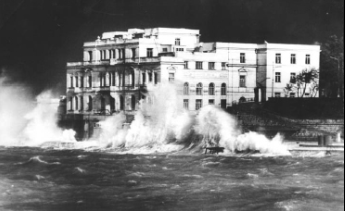THE A.O. KOVALEVSKY INSTITUTE OF BIOLOGY OF THE SOUTHERN SEAS

The A.O. Kovalevsky Institute of Biology of the Southern Seas (IBSS) is one of the oldest and most reputable marine research centres in the world. In 1871 Biological Station, the first in Russia and the third in Europe, was founded in Sevastopol on the initiative of Nikolai N. Miklukho-Maklai, the prominent Russian explorer, and A.O. Kovalevsky, the famous scholar and the first director of the Station. The building of the Station on the embankment of Sevastopol bay is a real pearl of city architecture.
The successors of N.N. Miklukho-Maklai and A.O. Kovalevsky were S.A. Zernov, V.A. Vodyanitsky and V.N. Greze whose names and scientific activity are closely associated with the Station and the institute. A.O. Kovalevsky, the prominent Russian evolutionary biologist and the founder of comparative embryology and physiology was the first director of SBS (1889 – 1901). From 1902 to 1930 the position was in succession taken by academicians V.V. Zalensky, N.I. Andrusov, V.I. Palladin and professor V.N. Nasonov. In 1930 S.A. Zernov, the celebrated hydrobiologist, headed SBS.
From 1931 till 1935 and from 1944 till 1968 SBS – IBSS was headed by prominent hydrobiologist, corresponding member of the Ac. Sci. of the UkrSSR, Honoured Scientist of the UkrSSR, V.A.Vodyanitsky.
Today IBSS is the largest Ukrainian marine research centre in the field of biology and ecology, that focuses on preservation and protection of marine environment, studies of biodiversity and dynamics of marine ecosystems, creation of new biotechnologies and methods for integral management of the coastal zones. Cherishing the 135-year-old classical academic traditions, the Institute of Biology of the Southern Seas increases and improves the scientific potential and welcomes international scientific co-operation.
The present IBSS includes 13 scientific departments, the Aquarium-Museum, scientific library, the editorial and publishing department, and the R/V Professor Vodyanitsky. Investigations both in basic and applied sciences are conducted. A number of laboratories are licensed to make ecological inspection. The personnel works out methods for assessing the productivity of seawater areas and the condition of phytoplankton community using satellite imagery data. The basic patterns of the variability of bio-optical characteristics of Black Sea phytoplankton were specified and used in elaborating the regional algorythm for assessing chlorophyll a concentration.
The Institute of Biology of the Southern Seas also develops study in mariculture – the new discipline for Ukraine – and the technologies for culturing marine and freshwater organisms. Results of the recent ecophysiological investigations underlie the optimum technological regimes for growing and processing mariculture organisms for nutritional, medicinal and cosmetical uses. The first in Ukraine bivalve mollusc farms were organized and the biotechnology for rearing viable juvenile Black Sea turbots was proposed. The expert personnel works out scientific-grounded proposals on preservation of the biodiversity and sustainable use of marine bioresources and on further development of fisheries and fish culture in Ukraine.
IBSS willingly co-operates with colleagues and research istitutions from abroad -Russia and other countries of the CIS, Bulgaria, China, France, Great Britain, Greece, India, Ireland, Kuwait, Malta, Mexico, Poland, Turkey, the USA and Vietnam – who share common interest in marine sciences and technologies and welcome partnership in implementing programmes and grants supported by INTAS, NATO, TACIS, IAEA, IOC UNESCO, ЕС, GLOBEC, MARS, CITES, GOOS, MEDCOAST, EUROCEANS, BSERP, UNEP, GEF, GLOBALLAST, FITA, SEPS, NEAR, COPERNICUS and others. The Institute of Biology of the Southern Seas is the Scientific coordinator of the marine investigations in the Karadag Natural Reserve, the head office of the International Union on Ecoethics.


